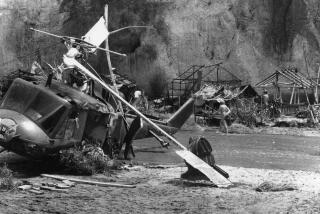Hazelwood Acquitted of 3 Charges; Guilty on 1 : Oil spill: An Anchorage jury finds the Exxon Valdez skipper culpable only on a minor pollution count.
- Share via
ANCHORAGE — Former tanker skipper Joseph Hazelwood, accused of being drunk, reckless and most responsible for the nation’s worst oil spill, was acquitted of all but a minor pollution charge by an Alaskan jury Thursday.
In a crowded courtroom that included his wife and father, Hazelwood, 43, was found not guilty of felony mischief, operating a vessel while under the influence of alcohol and reckless endangerment.
The lone guilty verdict was for the negligent discharge of oil, a misdemeanor carrying a maximum penalty of 90 days in jail and a $1,000 fine, far less than the 7 years and $61,000 fine he faced if convicted on all counts.
The verdicts came two days before the anniversary of the grounding of the Exxon Valdez, which spilled 11 million gallons of crude oil into Alaska’s Prince William Sound after slamming into a reef and ripping open its hull.
The jury deliberated less than 11 hours. Bursts of applause greeted each “not guilty” verdict read by Judge Karl Johnstone. Attorney Michael Chalos triumphantly slammed the defense table with his fist when the felony charge fell first.
“We’re not done. We’re going to appeal that misdemeanor, but we’re very happy that all the serious charges were rejected,” Chalos said later.
Sentencing was set for this afternoon.
Regardless of the appeal results, however, legal problems stemming from the grounding of the Exxon Valdez will continue to haunt Hazelwood and his former employer, Exxon Corp.
The company still faces federal criminal charges, and Hazelwood is named in about 150 civil lawsuits seeking financial damages for the oil spill that polluted hundreds of miles of Alaskan shoreline.
It was not clear how Hazelwood’s exoneration on serious criminal charges might affect those other cases, but state prosecutors had argued at the close of Hazelwood’s trial that Exxon would benefit from an acquittal.
Jurors were clearly swayed by defense arguments that the disastrous grounding was an accident, not a crime. Some members of the panel said after the verdict that they felt Hazelwood had been negligent, but not criminally reckless, when he left the bridge about 12 to 15 minutes before the accident.
The bearded Hazelwood was as stoic in victory as he had been through more than seven weeks of trial, but he smiled broadly as reporters and television cameras mobbed the defense table moments after the jury was polled.
“I’m just relieved,” he said.
“It’s been long and difficult. I was a pretty anonymous character up until about a year ago,” Hazelwood told reporters outside the courthouse. “I’m going to try to get on with my life now. I’d like to go back to sea. . . . It’s what I do.”
His attorney said that Hazelwood may talk to Exxon about reinstatement and would fight an expected U.S. Coast Guard effort to revoke his master’s license. “The only job he ever had was working on tankers owned or operated by Exxon, so I suspect that’s what he wants to do is go back to work as a captain,” Chalos said.
Jim Morakis, a spokesman for Exxon in New York, said the company, which has fired Hazelwood, was “pleased that the ordeal of the trial is over for captain Hazelwood and his family.
“The verdict would seem to confirm the view that the grounding of the Exxon Valdez was an accident,” Morakis said. “In light of pending litigation, any other comment would be inappropriate.”
After the verdict, jury foreman Lori Wing stood and smiled at Hazelwood, wishing him “good luck” before disappearing into the judge’s chambers with her colleagues.
Hazelwood’s tearful father, airline pilot Joseph O. Hazelwood, pushed through the media throng to embrace Chalos and greet his son. Suzanne Hazelwood, the former captain’s wife, reached through the crowd to squeeze her husband’s hand, then hurried from the courtroom.
Outside the courtroom, Hazelwood at one point broke away from his attorneys to shake hands with one of the jurors, Jeffrey Sage, a 28-year-old grocery manager.
“I’m glad to see justice done, Mr. Hazelwood,” Sage said. “So am I. Thank you,” Hazelwood responded.
Sage, whose sister was killed by a drunk driver more than 10 years ago, ridiculed the state’s drunk driving case against Hazelwood. He noted, for example, testimony of the 21 witnesses who saw Hazelwood before and after the grounding, all of whom said he did not appear to be under the influence of alcohol.
“For him to have had as much to drink as the state said he did, he would’ve had to crawl back to the ship,” Sage scoffed. “He would’ve been dead.”
The key sobriety test, taken 10 hours after the grounding, proved only that the captain’s blood alcohol level was .061%, slightly above the Coast Guard’s permissible level but well below the state’s .10% minimum standard.
Prosecutors brought in an Oklahoma toxicologist who used a complicated, and scientifically controversial, formula to estimate that Hazelwood was legally drunk when he sailed from Valdez.
The defense argued that Hazelwood, alone in his cabin and believing that his career had just ended on Bligh Reef, drank after the accident and skewed the test results. No evidence of that was presented during the trial, however, and Hazelwood did not testify.
Sage also said the panel concluded that Hazelwood’s orders before and after the grounding “all were prudent and precise. He was not impaired.”
Fellow juror Terrill Smith said the panel was leaning to acquittal from the very first ballot, although it took some time to reach unanimous agreement.
The incident that provoked the most discussion, the two jurors said, was Hazelwood’s absence from the bridge, leaving his third mate responsible for steering around ice floes.
Prosecutor Brent Cole had argued that was an example of criminal recklessness. The jury agreed with the defense, which noted that Hazelwood had given the correct course instructions and was not behaving differently than other captains in similar situations.
Both jurors also criticized the Coast Guard, which operates a $70-million vessel traffic center in Valdez. Coast Guard radar operators had failed to alert the Exxon Valdez that it was heading for the rocks of Bligh Reef.
“They obviously weren’t doing their jobs,” Sage said of the Coast Guard.
In fact, the issue of who is to blame for the disastrous effects of the spill remains unresolved, at least to some extent.
Defense lawyers had complained since the outset that Hazelwood was being held responsible not only for the grounding--which they conceded was “a tragic accident”--but also for the “botched containment and cleanup.”
“A lot of people shared the blame for what happened, but all sides were trying to sink captain Hazelwood. The state of Alaska, the Coast Guard, the federal government, they all wanted him to be their scapegoat,” said Tom Russo, another defense attorney.
“Perhaps now people will look beyond the captain.”
Environmental groups quickly reacted to the verdict by agreeing with the defense characterization of Hazelwood as a scapegoat. “Exxon, not one of its employees, should have been tried,” said Robert H. Sulnick, executive director of Santa Monica-based American Oceans Campaign.
Bruce Manheim, spokesman for the Environmental Defense Fund in Washington, D.C., said “we think Mr. Hazelwood has been to some extent set up by that corporation as a scapegoat and that Exxon is the real culprit in this disaster,” he said.
Alaska Atty. Gen. Douglas Baily said at a news conference in Juneau that he was pleased with the verdict and had congratulated the prosecutors on the single conviction.
He said the prosecution had proceeded against Hazelwood “certainly not as a scapegoat, but as a result of his own involvement as we saw it. It was always my view that the captain of that vessel is ultimately responsible.”
Former Valdez Mayor John Devins said Hazelwood was never the issue.
“The real issue confronting the state of Alaska is whether industry is prepared to prevent another oil spill,” said Devins, now a candidate for Congress.
Hazelwood’s legal battles began within a few days of the grounding. He was still in Valdez when the Coast Guard served a summons notifying the captain that his license would be reviewed. Exxon immediately fired the skipper.
Relieved of command and a job, and with his personal security in some doubt, the grounded captain drove to Anchorage and flew home to Huntington, Long Island, apparently unaware that local law enforcement officials were preparing a criminal action against him.
In the next few days, Hazelwood would become the object of a highly publicized manhunt launched by embarrassed Alaskan officials who didn’t know he had left the state.
A few days later, however, accompanied by his attorneys, Hazelwood surrendered to a court near his Long Island home. Amid a circus of reporters and TV cameras, a Suffolk County judge accused Hazelwood of complicity in an environmental disaster comparable to the atomic bombing of Hiroshima.
Bail was set at $1 million. Hazelwood spent a night in the county jail before an appeals court reduced it to $25,000.
Last May a grand jury in Alaska added the most serious charge--a felony count of criminal mischief that carried a potential penalty of five years in prison--setting the stage for the trial that began Feb. 5.
More to Read
Sign up for Essential California
The most important California stories and recommendations in your inbox every morning.
You may occasionally receive promotional content from the Los Angeles Times.












